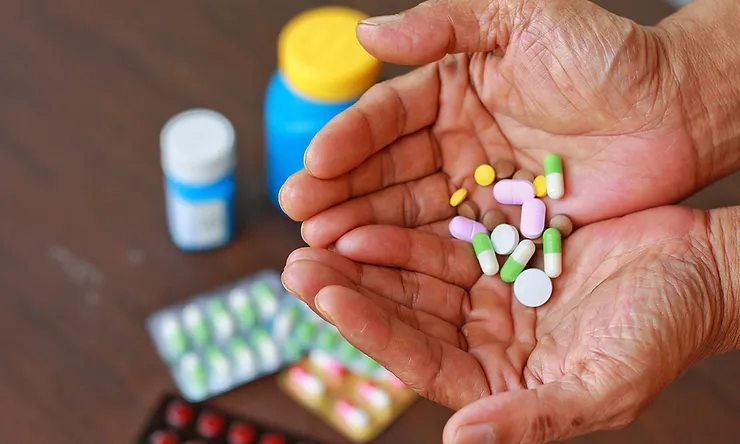
I work in a busy Urgent Care, serving aging adults who are victims of the mainstream medicine thinking: a prescription medicine for each of your ailments. Just today a gentleman complained that his mother’s doctor has her on thirty different medications! Let me address polypharmacy and what you can do about it.
Polypharmacy
How many medications do you really need? That all depends on how many illnesses you have… and your philosophy about medical treatment. Yet most seniors and near-seniors simply follow their doctor’s recommendations when it comes to prescriptions. They take all of them and don’t question the doctor, but I recommend that you question your doctor about each medicine!
International research[1] indicates that polypharmacy in most prevalent among those residing in nursing homes. In fact, nearly 50% of older adults take one or more medications that are not even medically necessary! Worse, the research shows a strong relationship between the number of medications (extent of the polypharmacy) and negative health consequences. Moreover, each additional prescription medicine adds additional financial burden.
How your doctor can reduce or eliminate prescription medications
In previous articles (December 2014) I addressed in detail ways to get off prescription drugs used for diabetes mellitus, heart disease (statins), high blood pressure, stomach acid disorders, asthma, COPD, depression, anxiety, psychoses, chronic pain, and infections. The bottom line to getting off medications for all these and other conditions is this: you can carefully reduce or eliminate prescription drugs if healing and safe alternatives are working.
Most mainstream doctors don’t know about natural therapies for these conditions. Therefore, the medications should be analyzed briefly with the aim to eliminate those that are:
1. The most potentially dangerous for long-term use. For example, Lisinopril for blood pressure control is quite harmless, has only one uncommon side effect I’ve ever seen (cough) and has many studies to show it reduces heart disease and extends life. Whereas, Proton-pump inhibitors (PPI’s) such as Nexium, Protonix and Prilosec for one month can raise stomach pH (less acidity) to help allow for healing, but long-term use is fraught with several unwanted adverse effects such as:
a. Disrupts healthy bacteria: taking omeprazole causes you to have higher counts of “bad” bacteria such as Salmonella and Campylobacter infections[2]
b. Increases stomach cancer risk[3] c. Reduces absorption of magnesium, associated with sometimes seriously low calcium and potassium within one year of taking a PPI.[4] Also, it can impair absorption of vitamin B12.[5] d. Increases risk of heart-related and other complications. One author stated, “Being highly lipophilic drugs, they may potentially affect several pathophysiological pathways involved in cardiovascular and kidney morbidity [disease], immune response and infections, absorption of selected nutrients, bone metabolism and cognitive function.”[6]
2. Easily removable with little to no ill-consequences.Examples are:
a. Blood pressure medicines often do very little to “control” blood pressure; stress, diet, and exercise play a huge roll here. I know because most patients who come to the Urgent Care with pain or distress have elevated BP but tell me it is usually normal at home when they are relaxed.
b. Statins can be removed if the patient is over age 75 (not effective) or is willing to do any number of lifestyle cardiovascular risk reduction methods
c. Any medicine that simply is not necessary to maintain health
3. Costly but do very little in the way of disease reversal (do any drugs actually reverse disease?) and symptom control.
It does take a person who is willing to take a close look at all the lifestyle habits that have that are turning on disease genes. It is a process, but after a year most medications can be eliminated by establishing natural and lifestyle changes. To long term health and feeling good,
Michael Cutler, M.D.
[1] https://www.ncbi.nlm.nih.gov/pmc/articles/PMC3864987/ [2] Ribiere S, Guillaumot MA, Barré A, Abou Ali E, Barret M, Chaussade S, Coriat R. [What is the REAL long-term risk of proton pump inhibitors?]. Presse Med. 2019 May;48(5):503-510. PubMed PMID: 30926204. https://www.ncbi.nlm.nih.gov/pubmed/30926204 [3] Ribiere S, Guillaumot MA, Barré A, Abou Ali E, Barret M, Chaussade S, Coriat R. [What is the REAL long-term risk of proton pump inhibitors?]. Presse Med. 2019 May;48(5):503-510. PubMed PMID: 30926204. https://www.ncbi.nlm.nih.gov/pubmed/30926204 [4] Hoorn EJ, van der Hoek J, de Man RA, Kuipers EJ, Bolwerk C, Zietse R. A case series of proton pump inhibitor-induced hypomagnesemia. Am J Kidney Dis. 2010 Jul;56(1):112-6. PubMed PMID: 20189276. https://www.ncbi.nlm.nih.gov/pubmed/?term=20189276 [5] Ribiere S, Guillaumot MA, Barré A, Abou Ali E, Barret M, Chaussade S, Coriat R. [What is the REAL long-term risk of proton pump inhibitors?]. Presse Med. 2019 May;48(5):503-510. PubMed PMID: 30926204. https://www.ncbi.nlm.nih.gov/pubmed/30926204 [6] Corsonello A, Lattanzio F. Cardiovascular and non-cardiovascular concerns with proton pump inhibitors: Are they safe? Trends Cardiovasc Med. 2018 Oct 21. Review. PubMed PMID: 30389278. https://www.ncbi.nlm.nih.gov/pubmed/30389278








